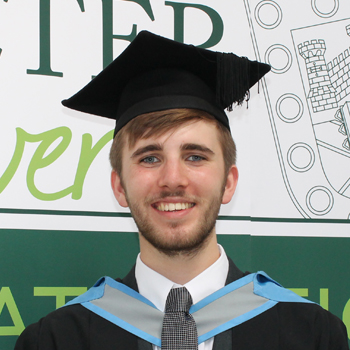
Henry Slesser
Luke Romaine
BSc Biological Sciences with Professional Placement
1. What has been the highlight of your time at Exeter?
Undertaking my final year research project was one of the most enjoyable parts of my degree. It gave me independence and allowed me to follow scientific questions I was curious about. Crucially, I gained essential experience in Molecular Biology in a world-class laboratory whilst working alongside, and getting advice from, researchers at the top of their field.
2. What will you miss the most about University?
I think I will miss the beautiful campus the most. I love that you can easily lose yourself amongst the trees, and catch a glimpse of a kingfisher diving in a pond, a rabbit sneaking into its burrow or simply a robin singing in a hedgerow. It can be a magical environment to work in, no matter the season.
3. What did you enjoy about your particular programme?
I have enjoyed the flexibility of the Biosciences programme. You can choose from a broad range of modules, allowing you to specialise in those you find most interesting and relevant to your future plans. I’ve been able to pursue different avenues of interests from Microbiology to Ecology. Most importantly I have learned about real-world issues from some incredible lecturers. They are all passionate about the subject, and this is made apparent in their lectures. The Ecology and Marine Biology lecturers have been brilliant. I can now begin to appreciate the pressures facing our natural environment, but crucially the world-class science going on in the background seeking the solutions.
4. What advice would you give to current and future students?
I would 100% recommend doing an internship during summer breaks. I have made the most of them during my time here, and my CV has benefitted. I have largely been able to do these internships because of the university’s “Access to Internships” (A2I) scheme. Obtaining a high-quality paid internship can be very difficult for students, especially if they don’t know anyone in the industry they want to work in. Unpaid internships are only possible with financial support from elsewhere. I have found that employers are happier to take you on if you have already secured funding. The A2I scheme gave me the confidence to approach employers for internships and secure some essential experience that I will need for future employment.
5. What are your plans now that you have graduated?
I’m hoping to continue onto a masters by research, with the future aim of being accepted onto a PhD programme.
